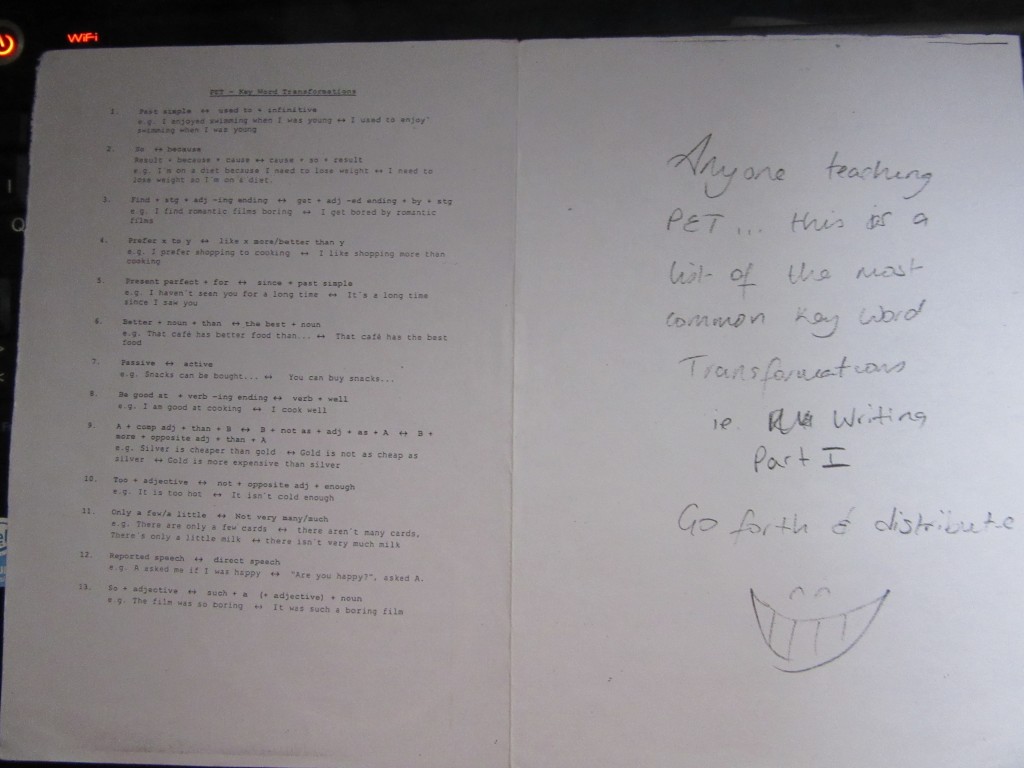Welcome to everything exam related! Exams are a big part of academy life these days and at Active, exam classes come in many shapes and sizes.
These include Cambridge Speaking lessons at San Felipe Neri (this year down to Lucy, Nick, Kate, Karin, Alex B and Simon B) as well as the full Four Skills exam practice that goes on at La Salle Viña (this year the preserve of Edel and Nathan).
But of course, most of our students are part of the academy-style KET, PET, FCE and CAE exam classes – which most teachers are also involved in this year- and this was the focus of the PDTM on exams on Wednesday the 14th November 2018.
Teachers had come with answers to a questionnaire we´d sent out the week before (scroll down to the bottom see it) and we dived straight into discussing attitudes, experiences and general approaches.
Something interesting that came up was how varied individual approaches were. These ranged from being very exam-based rubric-aware approaches to freer lesson designs which did deal with exam parts but focused more on general English, especially for .1 or first year exam classes. Knowing the exam handbook inside out was considered a must for everyone across the board.
In terms of tracking marks, some teachers keep very tight records of parts of exams practiced and indeed student scores, encouraging students to do so themselves in order for them to chart their progress. Other teachers prefer to limit mark-tracking to more formal testing occasions. A lively discussion ensued but all teachers agreed that what was important was to be aware of student progress over time and use this to guide their decisions in the classroom (say to spend more time on particular areas) and use it to raise awareness of weak areas in students too. Good for report writing we decided as it gives us something concrete to talk about.
We went on to cover understanding examiner mindset and the importance of embedding it in our lessons regularly; student-created content to engage our students in their own learning (people love to use and talk about stuff they´ve made) and, of course, best use of CEXTRA papers going forward. We concluded that the students would benefit more from the mock-exam experience if we forced them to self-mark using the marksheets before accepting their written work in the hope that it would eventually raise the quality of the writings handed-in. No-one wants to hand in something they know to be poor- part of the benefit of arming students with success critera in the first place. There are some signs that this approach is bearing fruit.
Kate then showed everyone the black folders again, highlighting the parts that could be of particular use in particular situations such as practice activities outside of class, the at-a -glance exam format, the error correction and self-study pages to train the students into becoming better learners. And , of course, the CEXTRA mark sheets I refer to above.
The folders were a really useful part of the session and as Keara and Alex CB said, you get given them in the first week of term and you know you are meant to use them but there is so much to take in that a lot of it goes over your head, so thanks Kate for the refresher and for reviewing such a wonderful practical work tool.
We finished off with a Show and Tell where teachers got to share their favourite practical activities in turn. My favourites? those that cultivate curiosity and team work as these lead to spontaneous communication. “Do nows” whether sentence transformations or discussion questions on the board to welcome students as they arrive in dribs and drabs and to focus that first moment (teacher´s book full of ideas for these). Student-generated content also proved very popular- Make your own gap-fills by blocking out all prepositions in a text, dictaglosses or “write an extra comprehension question” for fast finishers.
In short, individual experiences, varied approaches, different priorities. And all as valuable as the next. Thanks everyone for the fruitful morning of chat and discussion. Hopefully it left you feeling re-energized and inspired for you next exam lesson.
QUESTIONNAIRE FOR EXAM CLASSES
TEACHER-FOCUSED QUESTIONS
How do you feel about teaching exam classes?
How are they different to teaching general English classes?
What are the pros and cons of teaching exam classes?
How do you approach exam classes? Is everything in your class directed at exam practice? Should it be? Or not?
How do you prepare yourself for teaching exam classes?
STUDENT- FOCUSED QUESTIONS
How do you prepare students for teaching exam classes?
Do you keep a track of the parts of the exam you´ve covered and how many times you´ve covered them? How?
Do you keep track of the marks your students get? How?
Do you know which of your students are going to CEXTRA?
What do you do and/or your students do with the papers after they´ve done the exam?
Any other comments you´d like to add.







